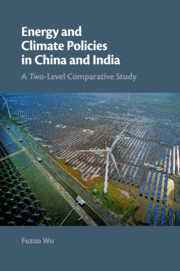Book contents
- Energy and Climate Policies in China and India
- Energy and Climate Policies in China and India
- Copyright page
- Dedication
- Contents
- Figures
- Tables
- Acknowledgments
- Part I Introduction and Analytical Framework
- Part II The Inside-Out
- Part III The Outside-In
- 5 Negotiating Climate Change: Proactively Free-Riding and Reactively Burden Sharing1
- 6 Domestic Climate Policies: Reactive
- Part IV Implications and Conclusion
- Index
5 - Negotiating Climate Change: Proactively Free-Riding and Reactively Burden Sharing1
from Part III - The Outside-In
Published online by Cambridge University Press: 28 September 2018
- Energy and Climate Policies in China and India
- Energy and Climate Policies in China and India
- Copyright page
- Dedication
- Contents
- Figures
- Tables
- Acknowledgments
- Part I Introduction and Analytical Framework
- Part II The Inside-Out
- Part III The Outside-In
- 5 Negotiating Climate Change: Proactively Free-Riding and Reactively Burden Sharing1
- 6 Domestic Climate Policies: Reactive
- Part IV Implications and Conclusion
- Index
Summary
- Type
- Chapter
- Information
- Energy and Climate Policies in China and IndiaA Two-Level Comparative Study, pp. 179 - 233Publisher: Cambridge University PressPrint publication year: 2018



